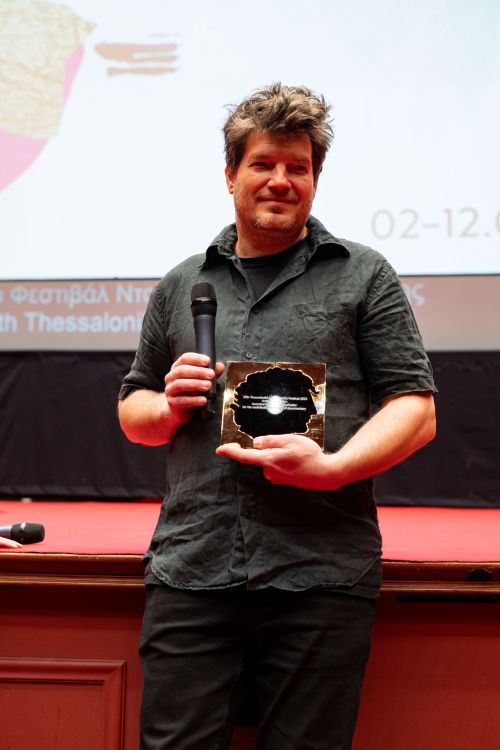Austrian film director Nikolaus Geyrhalter was honored on Tuesday March 7th by the 25th Thessaloniki Film Festival with an honorary Golden Alexander for his work, before the screening of his film Matter Out of Place, at Olympion theater. The films of the multi-talented filmmaker are screened as part of a tribute to his work hosted by the 25th TiDF.
The artistic director of the Festival, Orestis Andreadakis, bestowed the honorary Golden Alexander award to Nikolaus Geyrhalter: "He started from photography and went on to capture the most combative moments of life in the most restless regions of the earth. Great images, spectacular landscapes, sensitive portraits, fascinating stories of everyday life. Highly acclaimed, one of the most important contemporary representatives of documentary filmmaking worldwide, he is the man who speaks to us without any filters on humanity’s today and tomorrow. Ladies and gentlemen, please welcome Nikolaus Geyrhalter," he said, adding that "It is a great honor for the Festival" to award him with the Golden Alexander.
"Everyone here at the Festival has spoken with such kind words about me these days," Mr. Geyrhalter replied. "I want to thank you all from the bottom of my heart. I will also accept this award on behalf of all the people who have accompanied me during these years of my career, all those who have worked with me and for all the people who have agreed to share their stories with me and open up to me so that I can convey them. I thank you very much." The award ceremony was followed by a screening of the film Matter Out of Place.
The film shows litter on the coasts, in the mountains, at the bottom of the oceans, deep in the Earth's subsoil. The filmmaker sheds light on the enormous amounts of waste that have inundated the planet - from the mountain tops of Switzerland to the coasts of Greece and Albania, and from the inside of an incinerator in Austria to Nepal, the Maldives and the Nevada desert. A documentary about the man-made waste that surrounds us at every point and moment of our lives.
The screening was followed by a Q&A with the director. When asked by the audience about why he decided to hide the shooting’s locations in the film, he replied, "The locations are all there in the end credits. The reason they don't appear during the film is because they would draw the audience's attention to certain locations, and the film touches on a universal phenomenon. Watching a film is an experience, and nothing should distract the viewer from it."
Someone from the audience then stated that the power of the film lies in its aesthetics -the aesthetics of ugliness and questioned the director on which situations surprised him the most out of all the countries he visited. "It's hard to answer," replied Mr. Geyrhalter. "We scouted the locations before the shoot, so we knew all of them. Maybe Nepal was a surprise, because several things happened there that we didn't know about and there was no way to predict them, of course. We only knew that there was a huge landfill. Initially, we had Indonesia in mind, but Covid intervened and we ended up in Nepal. The filming locations, therefore, are not exactly representative because they were not all conscious choices. We knew we needed a huge landfill and footage of organized recycling facilities in central Europe. The Burning Man festival was also full of surprises. I had never been there before. Everything is completely different from your expectations there, even when you try to remain professional," he said.
When asked about the volume of garbage that is ultimately recyclable, the director replied that the amount changes depending on the region. "I can't be sure what the case in Greece is, but from the moment the garbage goes into the bin, a long process begins that has a whole industry behind it. From the moment you put a piece of rubbish in the recycling bin, a huge amount of energy is consumed until it can be reused. So, we cannot say that recycling solves the problem. The optimal solution would be to avoid so much waste. Unfortunately, many of the things you throw in the recycling bins cannot be recycled in the end (because they are dirty or unsuitable) and end up being burned as regular waste. Only a small portion of them is actually recycled. The process of recycling cannot continue indefinitely. If you want to hold onto something, hold onto this: just because you choose to recycle doesn't mean you'll succeed in doing so" he stressed. "But to be fair," he added, "this is especially true for plastic waste, which is the recyclable material the most difficult to handle. For paper and glass, the recycling rate is much better," he said.
In response to a question regarding the duration of the shots in the film, he commented: "It’s definitely a slow film. Its shots need time to work. It's not just about the image, but also about the sound and the emotion they evoke. I work simultaneously with many editors, not just one. We do test screenings, in which the audience also participates. I respect the opinion of the audience, the opinion of a person outside the professional circle is very important. During the editing process, we start with a fast pace which gradually slows down. We end up with a pace of 20-30 seconds per shot." He then concluded by saying, "The first stage is editing the material and the second one is editing the emotions, that is the time you deem necessary for the audience to grasp the message from the film.”















